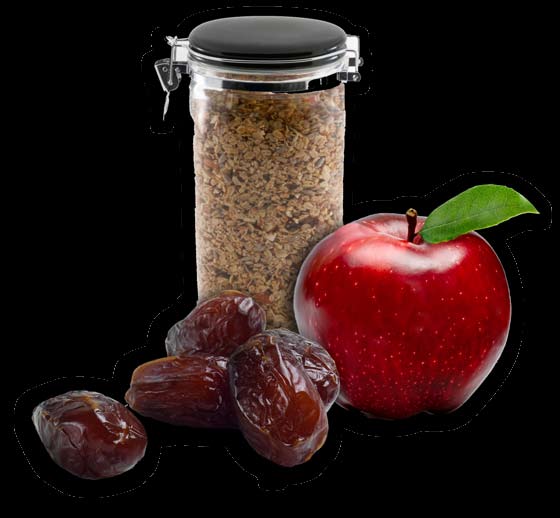190 calories
Protein per serving: 9 grams
To learn more about dealing with appetite loss, see the
section about weight loss on page 41.
14
1-800-4-CANCER (1-800-422-6237)




Changes in Sense of Taste or Smell
What it is
Food may have less taste or certain foods (like meat) may be bitter or taste like metal. Your sense of smell may also change. Sometimes, foods that used to smell good to you no longer do.
Why it happens
Cancer treatment, dental problems, or the cancer itself can cause changes in your sense of taste or smell. Although there is no way to prevent these problems, they often get much better after treatment ends.
Ways to manage with food
u Choose foods that look and smell good. Avoid foods that do not appeal to you. For instance, if red meat (such as beef) tastes or smells strange, then try chicken or turkey.
u Marinate foods. You can improve the flavor of meat, chicken, or fish by soaking it in a marinade. You can buy marinades in the grocery store or try fruit juices, wine, or salad dressing. While soaking food in a marinade, keep it in the refrigerator until you are ready to cook it.
u Try tart foods and drinks. These include oranges
and lemonade. Tart lemon custard might taste good
and add extra protein and calories. But do not eat
tart foods if you have a sore mouth or sore throat.
u Make foods sweeter. If foods have a salty, bitter, or acid taste, adding sugar or sweetener to make them
sweeter might help.
u Add extra flavor to your foods. For instance, you might add bacon bits or onion to vegetables or
use herbs like basil, oregano, and rosemary. Use
barbecue sauce on meat and chicken.
w w w.cancer.gov
15


u Avoid foods and drinks with smells that bother you.
Here are some ways to help reduce food smells:
• Serve foods at room temperature
• Keep foods covered
• Use cups with lids (such as travel mugs)
• Drink through a straw
• Use a kitchen fan when cooking
• Cook outdoors
• When cooking, lift lids away from you
Eat with plastic forks and spoons if
you have a metal taste in your mouth.
Other ways to manage
u Talk with a dietitian. He or she can give you
other ideas about how to manage changes in
taste and smell.
u Eat with plastic forks and spoons. If you have a metal taste in your mouth, eating with plastic forks and spoons can help. If you enjoy eating with chopsticks, those might help, too. Also, try cooking foods in glass pots and pans instead of metal ones.
u Keep your mouth clean. Keeping your mouth clean by brushing and flossing can help food taste better.
u Use special mouthwashes. Ask your dentist or doctor about mouthwashes that might help, as well as other ways to care for your mouth.
u Go to the dentist. He or she can make sure that your changed sense of taste or smell is not from dental problems.
u Talk with your doctor or nurse. Tell them about any changes in taste or smell and how these changes keep you from eating.
16
1-800-4-CANCER (1-800-422-6237)

Constipation
What it is
Constipation occurs when bowel movements become less frequent and stools become hard, dry, and difficult to pass. You may have painful bowel movements, feel bloated, or have nausea. You may belch, pass a lot of gas, and have stomach cramps or pressure in the rectum.
Why it happens
Chemotherapy, the location of the cancer, pain medication, and other medicines can cause constipation. It can also happen when you do not drink enough liquids or do not eat enough fiber. Some people get constipation when they are not active.
Ways to manage with food
u Drink plenty of liquids. Drink at least 8 cups of liquids each day. One cup is equal to 8 ounces. For ideas, see the list of clear liquids on page 49.
u Drink hot liquids. Many people find that drinking warm or hot liquids (such as coffee, tea, and soup) can help relieve constipation. You might also try drinking hot liquids right after meals.
u Eat high-fiber foods. These include whole grain breads and cereals, dried fruits, and cooked dried beans or peas. Try the recipe on page 19. For other ideas, see the list of high-fiber foods on page 55. People with certain types of cancer should not eat a lot of fiber, so check with your doctor before adding fiber to your diet.
w w w.cancer.gov
17


Talk with your doctor before taking laxatives,
stool softeners, or any medicine to
relieve constipation.
Other ways to manage
u Talk with a dietitian. He or she can suggest foods to help relieve constipation.
u Keep a record of your bowel movements. Show this to your doctor or nurse and talk about what is normal for you. This record can be used to figure out whether you have constipation.
u Be active each day. Being active can help prevent and relieve constipation. Talk with your doctor about how
active you should be and what kind of exercise to do.
u Let your doctor or nurse know if you have not had a
bowel movement in 2 days. Your doctor may suggest
a fiber supplement, laxative, stool softener, or enema.
Do not use any of these without first asking your doctor
or nurse.
18
1-800-4-CANCER (1-800-422-6237)




Reci pe
To help relieve constipation
Apple/prune Sauce
1/3 cup unprocessed bran
1/3 cup applesauce
1/3 cup mashed stewed prunes
Yield:
















